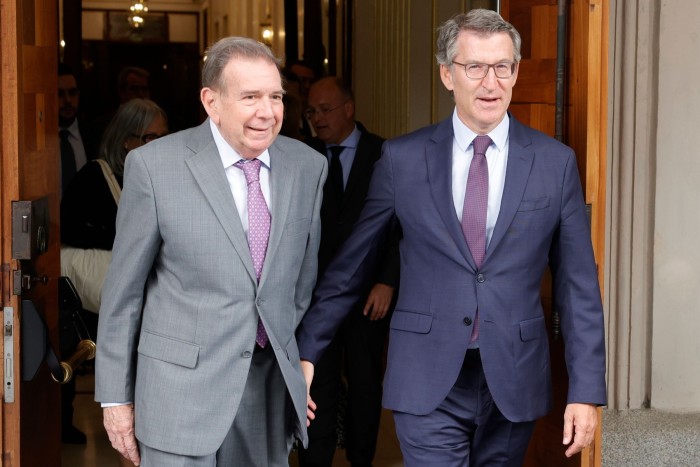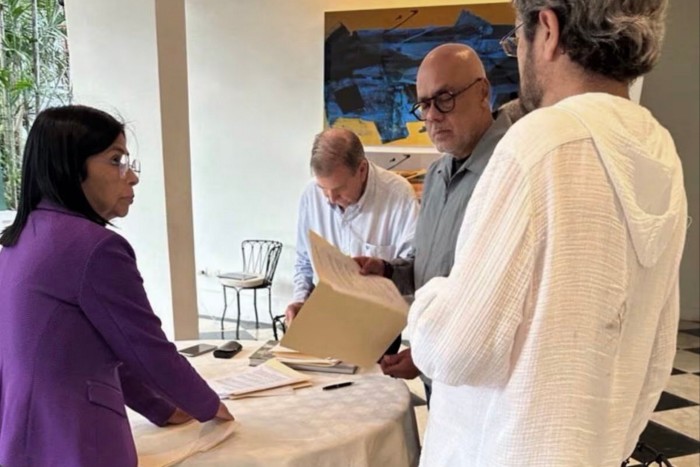
Unlock the Editor’s Digest for free
Roula Khalaf, Editor of the FT, selects her favourite stories in this weekly newsletter.
Spain has been heavily criticised for allegedly facilitating the exile of Venezuela’s main opposition presidential candidate, who under Spanish diplomatic protection was pressured into signing a document recognising President Nicolás Maduro’s victory.
Edmundo González, a former Venezuelan diplomat who the opposition says won the July election, left Caracas on September 7 to seek political asylum in Spain after spending weeks in hiding to dodge arrest. His departure dealt a major blow to the opposition, which had vowed to install González as president when Maduro’s current term ends in January.
Maduro has launched a sweeping crackdown since the election, in which he claimed to have won a third term in a result recognised by Russia, China, Iran and North Korea but not the west. The opposition has produced copies of about 80 per cent of the official tally sheets to prove that González trounced Maduro and the US has backed the claim.
González, who is 75 and has health problems, said this week that he was forced to sign under duress a letter recognising Maduro’s victory as a condition for being allowed to leave Venezuela.
Maduro’s government later published what it said were photographs of González signing the document inside Spain’s embassy residence in Caracas during a meeting with Maduro’s top political fixer Jorge Rodríguez and his sister Delcy, who is vice-president. The Spanish ambassador to Venezuela, Ramón Santos, was also present.

Spain’s conservative opposition leader Alberto Nuñez Feijóo has called for the resignation of Spanish foreign minister José Manuel Albares and the ambassador over the affair, saying Spanish diplomacy “cannot be at the service of a dictatorial regime”.
A senior Brazilian government official told the Financial Times that the Rodríguez siblings visited the residence to put pressure on González, which was something that “never should have been allowed”.
“Maduro pushed [González] out of the country through intimidation and . . . the Spanish state was the main facilitator,” the official said. “They have to explain what they did and be held accountable.”
The Spanish government rejects allegations that it had a role in forcing González out of the country and insists it had sought to ensure the opposition leader’s security and had been responding to his asylum request.
González had sheltered safely for almost five weeks in the Dutch embassy residence after the election but was only visited by the Rodríguez duo after moving to the Spanish residence.
González became depressed when he realised, about three weeks after the election, that the Maduro government was not going to collapse, and that he would either have to remain indefinitely under diplomatic protection in Venezuela or seek asylum abroad, according to a person close to the opposition.
Around this time he spoke to José Luis Rodríguez Zapatero, a socialist former Spanish premier close to Maduro’s government, who was a key figure in brokering the agreement that led to González’s departure, the person told the FT.
The Brazilian official said he understood that Zapatero had discussed the plan to exile González to Spain with the Rodríguez pair “and helped implement it”. Zapatero could not be reached for comment.

González was transferred to the Spanish embassy residence on September 5 believing that he would receive asylum in Spain, with the final details to be worked out with the ambassador. In the event, two days of negotiations ensued, during which the Rodríguez pair appeared in person with a document for González to sign.
Albares told reporters in Brussels on Thursday that his government had not invited anyone to visit González at the ambassador’s residence and “did not take part in any negotiation of any document”. The ambassador was present during the talks and appeared in the photographs because the residence only had one reception room, he added.
Christopher Sabatini, a Latin America expert at Chatham House, said the signature under such circumstances “violates the very notion of diplomatic asylum, making the Spanish government complicit in the Maduro government’s electoral theft and repression”.
In a statement on Thursday that was intended to calm the storm, González thanked Spain for its support and said: “I was not coerced either by the Spanish government or by the Spanish ambassador to Venezuela, Ramón Santos.” A Venezuelan opposition source in contact with González said he made the statement after an urgent request by Albares.
Venezuela’s government has attempted to exploit González’s departure as a propaganda coup, painting him as weak and cowardly. Jorge Rodríguez brandished a copy of the González document at a news conference on Thursday, describing it as “nothing other than a capitulation”.
Mocking González’s claim that he signed under duress, Rodríguez played excerpts of an audio recording that he said showed a convivial atmosphere with discussions lubricated by whisky. González said the meeting had been photographed and recorded without his permission.
“They showed up with a document that I would have to sign to allow my departure from the country,” González said. “In other words, either I signed or I would face consequences. There were some very tense hours of coercion, blackmail and pressure.”
Ryan Berg, director of the Americas programme at Washington think-tank CSIS, said: “The available evidence appears to suggest Spain played a role in enabling Edmundo González’s forced exile by the regime — a huge blow to Venezuelans who have hoped for change and voted for him.”